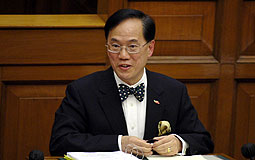 |
Many voices: Chief Executive Donald Tsang says representatives from the public and business sectors, economic experts, academics and labour experts will be invited to join an economic summit on Hong Kong's future. |

|
The Government will organise an economic summit in September to thrash out Hong Kong's future development strategies in response to the national 11th five year plan, Chief Executive Donald Tsang says.
Speaking at the Legislative Council's question-and-answer session this afternoon, Mr Tsang said representatives from the public and business sectors, economic experts, academics and labour experts will be invited to join the summit.
Topics to be discussed include:
* As the renminbi moves towards free convertibility, how Hong Kong can play its role as an international financial centre?
* Given the differences between Hong Kong and the Mainland, how Hong Kong can better enhance the exchange between industries?
* How Hong Kong can tie in with the Mainland efforts in enhancing its innovation technology capability?
* What kind of insight Hong Kong can gain from the national 11th five year plan?
* What kind of challenges Hong Kong faces and what kind of tactics should be adopted in coping with these challenges?
Action plan to be worked out
Mr Tsang hoped the above issues could be explored and resolved at the summit. He said the summit would be the starting point and the Government and participants would work out which bureaus, departments, advisory bodies and business sectors would be responsible for the follow-up action.
"We would also have to compile a work plan with clear objectives and practical follow-up action. The Government will follow up closely the summit's recommendations through various channels and the works will be completed within the first half of next year."
The summit will differ from the Policy Address and the Budget in terms of scope, Mr Tsang said.
"The summit will be a pragmatic discussion forum and will be disbanded after the formulation of the action plan. Its terms of reference will not duplicate that of the Commission on Strategic Development. The commission will focus on macro-strategies and propose development directions. Therefore, the two bodies will be complementing each other."
Mr Tsang said Hong Kong should strive to reach a basic consensus on the city's future direction and strategies for economic development, adding lawmakers' support would also play an important role in the process.
Social security a priority
Speaking on elderly issues, Mr Tsang said no city could avoid an ageing population, adding the Government had been increasing its spending on elderly services.
Noting the Government attached great importance to elderly welfare, he said the Elderly Commission would look into the issue and recommend interim and long-term measures.
He said any adjustment in Comprehensive Social Security Assistance benefits would spark controversy, adding a decision should not be made before social consensus was reached on the issue.
Turning to electricity tariffs, Mr Tsang said he hoped the recent review on the power market development would help the opening up of the market and minimise the difference between the electricity tariffs of residents living on Hong Kong Island and those in Kowloon.
On the question of a minimum wage, the Chief Executive said he fully understood workers' aspirations and the Government was handling the issue in a pragmatic way.
Minimum wage talks under way
Noting a public consensus must be reached before introducing a legislative proposal on a minimum wage, Mr Tsang said the Labour Advisory Board was now discussing the issue. "I can't come up with a timetable at this moment but we will work hard."
He said the Government adopted a two-pronged approach in tackling labour issues. "On one hand, we will continue our discussions on a minimum wage in the Labour Advisory Board. On the other hand, we will promote the use of 'standard contracts' in various sectors so that workers' rights can be better protected."
When asked when the Government would fully implement 'small-class teaching', Mr Tsang said it had taken the first step and would continue to implement the initiative. However, given the limited resources, the Government had to introduce 'small-class teaching' in stages.
Communication essential
Speaking on how to foster harmony in the community, Mr Tsang said he would keep up his communication with political parties and individual members of the public.
He said forming closer alliances with people or parties sharing the same values was a political reality, adding he would continue to listen to the views of parties with different political beliefs and would explain the Government's stance with patience.
"But communication is a two-way street and there should be interaction. If there are constructive dialogues, then we can build good relations."
He urged the 'opposition parties' not to oppose the Government's policies just for the sake of undermining the Government's credibility and getting media attention.
Go To Top
|



